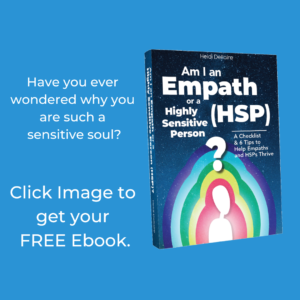Empathy is a powerful tool that allows us to understand and connect with others on a deeper level. However, for some people, empathy can be both a blessing and a curse. Empaths and HSPs are people who have a heightened sensitivity to the emotions and energy of others, often to the point where they feel overwhelmed and drained by the intensity of their own emotions and those of others.
While empaths can be incredibly compassionate and nurturing individuals, their sensitivity can also leave them vulnerable to emotional manipulation and abuse, particularly when dealing with individuals who have personality disorders such as Borderline Personality Disorder (BPD) and Narcissistic Personality Disorder (NPD) or a combination of both.
BPD is a condition characterized by intense and unstable emotions, impulsive behavior, and unstable relationships. People with BPD may struggle with feelings of emptiness and abandonment and may engage in self-harm and suicidal behavior. They may also exhibit extreme mood swings, have difficulty regulating their emotions, and may engage in impulsive and reckless behavior, such as substance abuse or promiscuous sexual behavior. Individuals with BPD may also struggle with interpersonal relationships, particularly with maintaining healthy boundaries and managing their emotions in relationships.
NPD, on the other hand, is characterized by a grandiose sense of self-importance, a lack of empathy for others (self-centered), and a preoccupation with power, success, and admiration. People with NPD may exhibit entitled behavior, engage in manipulative and exploitative behavior, and may be unable to recognize or accept criticism or feedback. They may also be prone to extreme mood swings, particularly when their sense of self-worth is threatened.
Dealing with individuals with BPD and NPD can be challenging for anyone (especially if an individual displays characteristics of both disorders), but it can be particularly difficult for empaths. Empaths may find themselves drawn to individuals with these conditions, as their heightened sensitivity to the emotions of others can make them particularly vulnerable to the emotional manipulation and abuse that individuals with BPD and NPD may engage in. A BDP or NPD will often try to depict you in the worst light and it is actually all of their traits and actions being projected onto you. They can’t see or understand that they are projecting their own faults and insecurities onto you.
However, setting and maintaining healthy boundaries is crucial when dealing with individuals with these conditions, both for the empath’s own well-being and for the well-being of the person with the condition.
Listen to the latest episode of the Heal Your Story Podcast
Here are some tips for empaths who are dealing with individuals with BPD and NPD or a combination of both:
Set clear boundaries: Establishing clear boundaries is essential when dealing with individuals with BPD and NPD. This means clearly communicating what behaviors are and are not acceptable, and enforcing consequences if those boundaries are violated. It’s important to be consistent in enforcing boundaries, as individuals with BPD and NPD may test them repeatedly…and they will. Many people who are struggling in relationships with someone who has these disorders has to go “no contact” in order to find some sense of sanity and peace.
Practice self-care: Empaths are particularly vulnerable to burnout and emotional exhaustion, especially when dealing with individuals with BPD and NPD. Practicing self-care, such as getting enough sleep, eating a healthy diet, and engaging in regular exercise, can help to mitigate the effects of emotional exhaustion and stress. Engage in activities and with people that bring you joy and peace.
Be mindful of your own emotions: Empaths may absorb the emotions of others to the point where they lose touch with their own feelings. It’s important to be mindful of your own emotions and to take time to process and manage them in healthy ways. Don’t get too caught up in the BPD/NPD’s behavior that you lose yourself to emotions. Step away and gain perspective.
Don’t take things too personally: Individuals with BPD and NPD may engage in behavior that is hurtful or insensitive, but it’s important to remember that their behavior is a reflection of their own struggles and insecurities, not a reflection of your worth as a person. Someone with BPD/NPD will constantly put you on a pedestal and then tear you down. They will tear you apart in public or on social media and then semi-apologize years later to test your boundaries only to tear you down again. They can’t help themselves. A BPD/NPD can only see the world through a distorted account of events. They will twist those events to suit their “it’s all about me” narrative.
Seek support: Dealing with individuals with BPD and NPD can be emotionally exhausting and overwhelming for empaths. However, it’s important to seek support when needed. This may include therapy, trauma-informed coaching, support groups, or simply confiding in trusted friends and family members. And if you have to, seek legal support if they are constantly defaming you and trying to damage your reputation.
If you are ready to reclaim your life after this very unhealthy dynamic with a BPD or NPD, then reach out and let’s have a conversation about how to heal, feel empowered and find peace and joy again.
Just click the link, let me know a bit about your situation and we will get on a call and I will personally teach you my system to find greater peace and joy! It’s time to stop being overwhelmed, frustrated & confused about your next steps for reclaiming your life. There’s a simple path that works: BOOK A HEAL YOUR STORY STRATEGY SESSION
~Heidi
Pick up this FREE Ebook all about Empaths and HSPs.

References: Diagnostic and Statistical Manual of Mental Disorders (DSM-5-TR)
© Heidi Delllaire / H Hill Incorporated



2 thoughts on “Empaths’ Guide to Setting Boundaries and Managing Relationships with Narcissistic Personalities”
Thank you this article nailed it. It is tough to navigate what you personally own and what the other person does. Really messed with me and I do believe that getting a second opinion or 3rd is a good idea before accepting a mental health diagnosis.
Thank you so much for your comment. Yes, always search out the right kind if help.